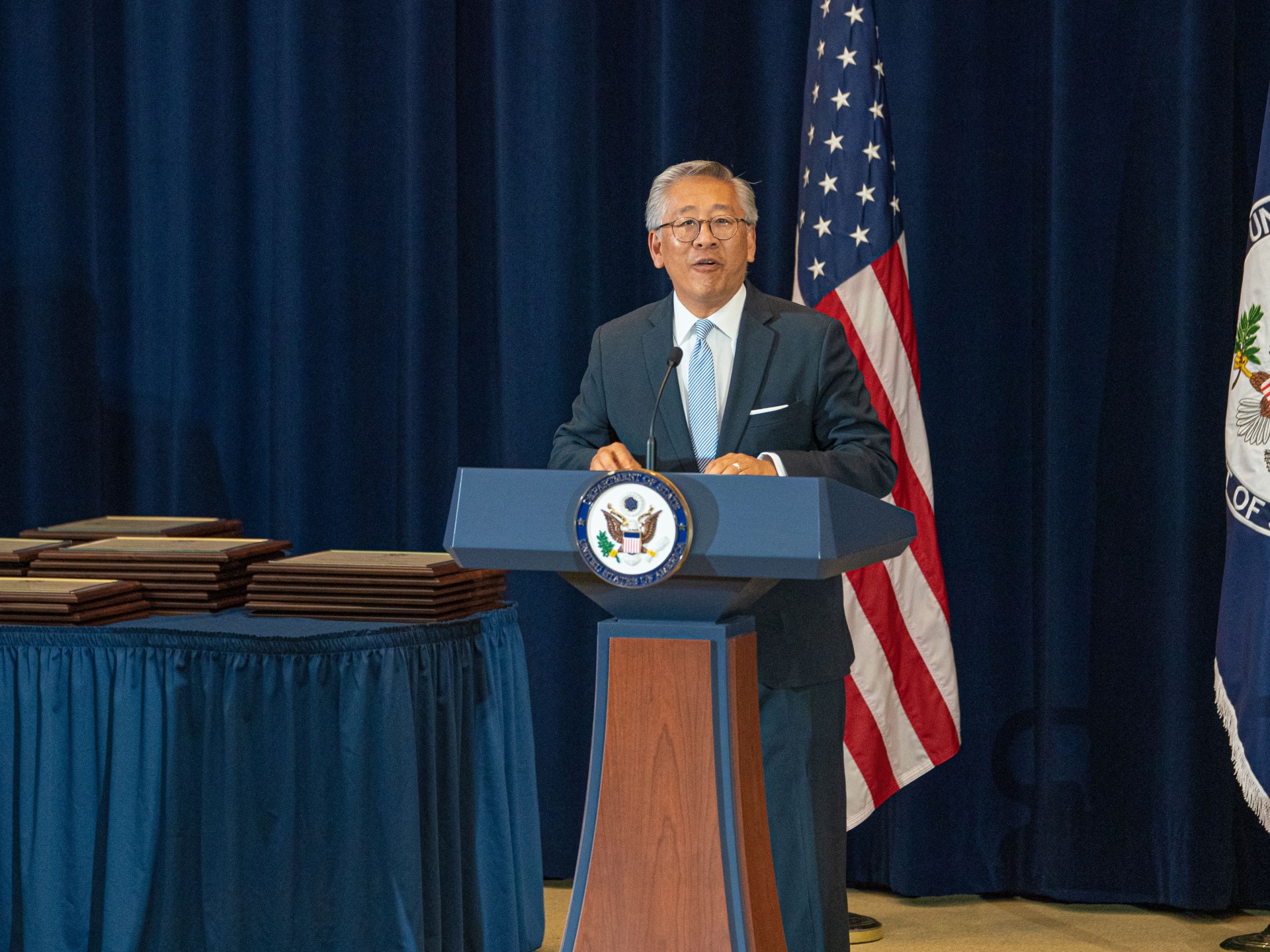Ahead of congressional hearing, US worried over Pakistan ‘electoral abuse’
Islamabad, Pakistan – A senior United States Department of State official has described Washington’s concerns over “electoral abuse and violence” in the lead-up to Pakistan’s general election last month in written testimony submitted a day before a congressional hearing about relations between the two nations.
Donald Lu, the assistant secretary of state for South and Central Asian affairs, said President Joe Biden’s administration identified a series of “irregularities” in the conduct of the February 8 elections as he emphasised the importance of ties between Washington and Islamabad.
A subcommittee of the Committee on Foreign Affairs in the US House of Representatives is holding a hearing on the “future of democracy in Pakistan and the US-Pakistan relationship” on Wednesday. The hearing was announced last week after more than 30 members of Congress wrote to Biden and Secretary of State Antony Blinken, asking them not to recognise Pakistan’s new government under Prime Minister Shehbaz Sharif. The February 8 elections were marred by widespread allegations of electoral manipulation, unusually delayed results and rigging.
The State Department had voiced concerns over the elections at the time, but Pakistan has consistently denied the allegations. After criticism from the West, Pakistan’s Ministry of Foreign Affairs on February 10 said it was surprised by the reactions, which failed to “acknowledge the free and enthusiastic exercise of the right to vote by tens of millions of Pakistanis”.
Lu’s comments before the congressional hearing, however, “drill down a bit deeper” on those previous comments, the US diplomat said.
“We were particularly concerned about electoral abuses and violence that happened in the weeks leading up to the elections,” Lu said before detailing attacks by armed groups on security officials and politicians, the harassment of journalists, and the prevention of some political parties and candidates from registering for the elections.
Former Prime Minister Imran Khan’s Pakistan Tehreek-e-Insaf (PTI) party was barred from using its electoral symbol, a cricket bat, days before the polls when the Election Commission concluded that the party had not held internal elections on time. Khan and many other party leaders are under arrest.
Still, candidates backed by the PTI, who had to run as independents, emerged as the largest bloc in the National Assembly with 93 seats.
The final tally of the results was announced more than 40 hours after polling stations closed, and it showed the Pakistan Muslim League-Nawaz (PMLN) and Pakistan People’s Party (PPP) finishing in second and third place with 75 and 54 seats, respectively.
After the PTI’s refusal to form an alliance with either of them, the PMLN, PPP and other smaller partners assembled a coalition to form the government, which is headed by the PMLN’s Sharif, who became prime minister for the second time.
When the congressional hearing into US-Pakistan ties was announced, Islamabad had welcomed the session and said it “believes in constructive engagement on all matters”.
“We respect the prerogative of legislative bodies to discuss and debate international issues,” a Pakistani Foreign Ministry spokesperson said last week. On Wednesday, Foreign Ministry officials told Al Jazeera they did not wish to comment further on Lu’s testimony.
But Lu’s statement on the eve of the hearing suggested that the US retains concerns about the conduct of the February 8 elections.
“On the day of the elections, an internationally respected local election monitoring organization said that they were barred from observing vote tabulation in more than half of the constituencies across the country,” Lu wrote in his testimony.
“And despite a high court instruction not to interrupt internet service on election day, authorities shut down mobile data services, the principal means by which Pakistanis access social media and messaging applications,” he further wrote.
Pakistan has defended its decision to cut internet access, pointing to a series of attacks in the lead-up to the vote. The government described the move as part of “security measures [that] are essential to maintain the law and order situation and to deal with potential threats”.
Lu is no stranger to US-Pakistan tensions. Khan, the former Pakistani prime minister, publicly accused the US diplomat of delivering a warning to the then-Pakistani ambassador in Washington, suggesting that the removal of Khan from office would help improve ties. At the time, Khan was strengthening ties with Russia despite its war on Ukraine.
Khan and his PTI government were removed from power in April 2022 through a parliamentary vote of no confidence, a first in Pakistan’s history. The US has repeatedly denied Khan’s allegation that it was involved in any conspiracy to remove him from office.
“They’ve always been false. You’ve heard me say that more than once, more than twice, more than 10 times probably,” State Department spokesperson Matthew Miller said last week.
In January, Khan was sentenced to 10 years in prison along with former Foreign Minister Shah Mahmood Qureshi on accusations of revealing state secrets, a case pertaining to Lu’s alleged message.
In his written statement, Lu emphasised Pakistan’s importance to the US as a partner and said the two countries closely cooperate on threats from armed groups as well as bolstering “respect for human rights, including religious freedom”.
“Most importantly, the United States plays a critical role in promoting economic stability in Pakistan,” the official said.
Pakistan has faced a mounting economic crisis over the past two years and barely averted default through a last minute International Monetary Fund (IMF) loan last year worth $3bn.
Hours before the subcommittee meeting, the US-based IMF confirmed that Pakistan is eligible to receive the remaining $1.1bn from the loan programme and said the country’s “economic and financial position has improved”.




